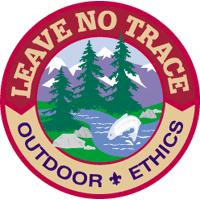
Rivers and Waterways

Water and air, the two essential fluids on which all life depends, have become
global garbage cans. |
 Water is a great durable surface for travel. There is no trace of our passing as our wake disappears. When traveling by water, either in sea kayaks, canoeing on lakes, or rafting down river corridors, the camping impact is highly concentrated along the water's edge.
Water is a great durable surface for travel. There is no trace of our passing as our wake disappears. When traveling by water, either in sea kayaks, canoeing on lakes, or rafting down river corridors, the camping impact is highly concentrated along the water's edge.
Often, trip itineraries are similar for each group passing through resulting in even more concentrated impact on sites that are about a day apart rather than evenly scattered along the waterway.
Campsites can be severely impacted by many visitors during a single season. It is sometimes necessary for land managers to step in and close sites or entire waterways for rehabilitation.
Most Leave No Trace principles hold true on rivers, lakes, and other waterways, but there are a few special concerns to minimize our impact of our country's waterways:
- Plan Ahead
- Learn about specific regulations and issues on this particular river.
- Use a knowledgable guide on new rivers. Use a river guidebook and map to plan your trip.
- Secure required permits early. Some areas have lottery permits so start planning early.
- Schedule trip during the time of year when appropriate river flows for your group's skill level will be most likely. Stay informed of flow fluctuations as you approach your trip date.
- Trips on weekdays rather than weekends and during off-season provide more solitude and wildlife viewing opportunities.
- Create a flexible schedule allowing you to make use of less-used campsites.
- Durable Surfaces
- Use established campsites large enough for your group.
- Beach your craft at an established landing site or onto sand or rock rather than soft, grassy shore.
- Use extra care in walking only on sand, not vegetation around camp areas.
- Campfire Impact
- Use cookstoves instead of campfires.
- If you have a fire, only use existing firerings. Don't build new rings or dig pits.
- Pack in your own charcoal or firewood. There is often very limited fuel along the river corridor.
- Bag all ash and pack it out. Ash washed downriver floats and leaves black soot on downstream beaches.
- Dispose of Waste
- Check local regulations for guidelines on waste disposal since there are a number of possible recommendations.
Cat holes quickly convert a campsite into a litter box. Use of a portable toilet is mandatory in many river corridors. Packing out all feces and toilet paper ensures no impact.
There are many commercial or homemade toilet options. See a list from the BLM Here.
Liquid waste is usually dumped in the main current of high volume rivers and allowed to dilute as it is washed downstream. Along small rivers, scattering liquid waste at least 200 feet from shore is preferred. - Using a tarp as the kitchen floor is helpful to catch food and trash. This is not much of a burden in a watercraft and minimizes the food bits that can attract animals.
- Check local regulations for guidelines on waste disposal since there are a number of possible recommendations.
- Leave What You Find
- Waterways were the highways of early inhabitants. Ancient structures, artifacts, and rock art are abundant along rivers. Be sure to leave them undisturbed.
- Prevent the spread of non-native species by thoroughly cleaning equipment after a water trip and properly disposing of live bait.
- Respect Wildlife
- Water is a critical resource for wildlife. Give wildlife plenty of room.
- Avoid trips during mating and nesting season if your presence will impact those activities.
- Be Considerate of Other Visitors
- Leave larger campsites for larger groups if your group can fit in a smaller area.
- Avoid camping, eating, and long rest breaks near popular rapids where you may impact scouting and portaging.
- Canoes, kayaks, and other non-motorized craft usually have the right-of-way over motorboats.
- Keep an eye out for fishermen and give them plenty of room, especially if they are wading or fishing from shore.
- Let other groups you meet on the river know your plans and where you expect to camp for the night. This can help distribute impact and increase privacy.

